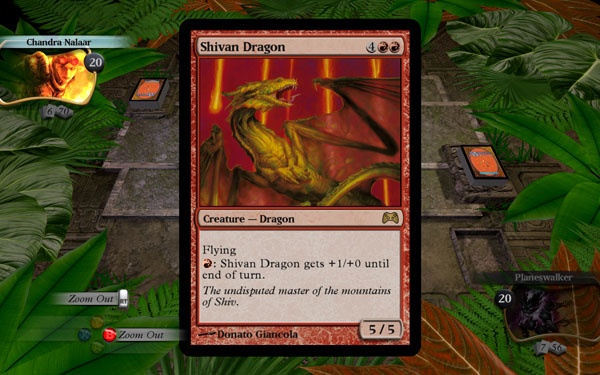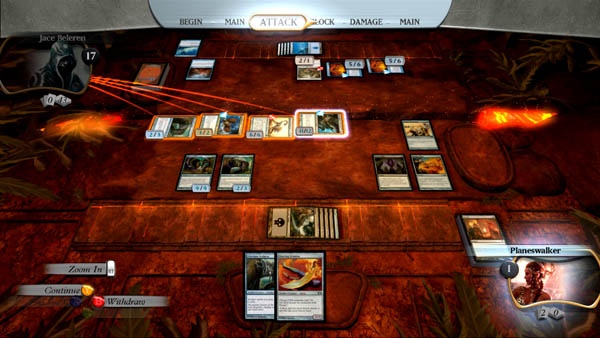Magic: The Gathering ushered in the era of the collectible card game with its debut in 1993, and more than 15 years later, its success shows no signs of flagging. However, despite Magic's popularity, its complexities can make jumping in intimidating to newcomers. Magic: The Gathering - Duels of the Planeswalkers on the Xbox Live Arcade is a faithful representation of the card game that makes learning the ropes easier and more enjoyable than it might be at your local hobby store. It feels a bit more like a teaching tool and a commercial for the card game than a stand-alone product, but it's a great way to see what all the fuss is about, and it's a good game in its own right.

A game of Magic represents a battle between powerful mages called planeswalkers. You and your opponents each start with 20 life points, and you play cards to summon the creatures and cast the spells you'll use to protect yourself and defeat your rivals. If you're a Magic neophyte, you'll likely want to start off with the interactive tutorial, which familiarizes you with the basic flow of the game. Each player starts by drawing seven cards from his or her deck. During your turn, you can play one land card from your hand, which is crucial because you must draw on the mana supplied by the land to play most of your other cards. A weak monster might require only one mana to summon, while a more powerful one might require five or six. The fact that you can play only one land card per turn ensures that there's a slow build to each game, preventing players from trotting out their most powerful monsters and wiping out the opposition too early on.
The tutorial does a decent job of bringing you up to speed on the basics of how to play, but it leaves all the finer details untouched. You'll encounter cards with properties like flying, first strike, fear, mountainwalk, and more, and while you can pull up informative text on any card in play at any time, it takes a little while to grasp how each card interacts with every other card. Once you've figured it out, though, you'll likely find that Magic is an engaging mix of strategy and luck. Your decisions definitely have an impact on the game's outcome, but a lucky draw can also sometimes spell the difference between victory and defeat.
Like the card game, Duels of the Planeswalkers is much more enjoyable with friends. If you're new to Magic, it's easier to learn with friends, and if you're already proficient, you'll find summoning a craw wurm to lay the smack down on a friend more rewarding than doing so to an AI opponent. You can compete in standard two-, three-, or four-player games, or in the two-headed-giant team mode, in which two teams of two battle it out. There are also ranked matches for those who are more serious about competing, but sadly, opponents quitting early when they start to lose is a rampant problem here.
In addition to online play, there's a campaign in which you fight a series of 16 increasingly challenging duels. The AI is competent enough to make these duels engaging, and as you progress, you'll unlock new decks and cards. There are eight decks in all, one for each of the five colors of Magic and three that combine cards from two or three colors. The differences between the decks are significant enough to dramatically affect the way you play the game. The blue deck, for instance, features numerous counter spells and spells that let you take control of other players' creatures, while the green deck has some powerful monsters that can trample over the enemy's defenses, if you can amass the mana to summon them. The eight decks here offer a decent variety, but unfortunately, you're never given the freedom to mix and match cards to create your own custom deck. This ensures that you always go into battle with a balanced deck that gives you a fair shot at victory, but to players who know how to put a solid deck together, this will feel needlessly restrictive.

Outside of the campaign, there's an excellent set of puzzle-like challenges. These eight increasingly challenging scenarios put you in a do-or-die situation where you have just one turn to win the game. There's always a way to do it, but you'll have to carefully consider the cards in your hand and the cards your opponent has played in order to find it. They won't take you very long, but while they last these challenges are very compelling.
The visuals take the standard look and layout of the card game and then make it look like it's being played by powerful wizards. Cards you play from your hand float down onto the table, bathed in a magical glow, and those that represent flying creatures hover just above the playing surface. By default, simple but evocative damage effects play out whenever two cards meet in battle, though they slow down the flow of the game, so you'll likely opt to turn them off after a while. And you can zoom in on any card in play and get a good look at its hand-drawn artwork. The music is appropriately dramatic but a bit repetitive and distracting, and it can thankfully also be turned off.
If you're already a Magic expert, this is an acceptable way to get in a few games online with friends, though you'll likely find the inability to create your own deck to be a pretty major drawback. If you're a Magic neophyte, you'll get more out of this experience. And while 10 bucks isn't exactly a bargain, it may seem like one compared to what you end up spending on real Magic cards if this game casts its spell on you.